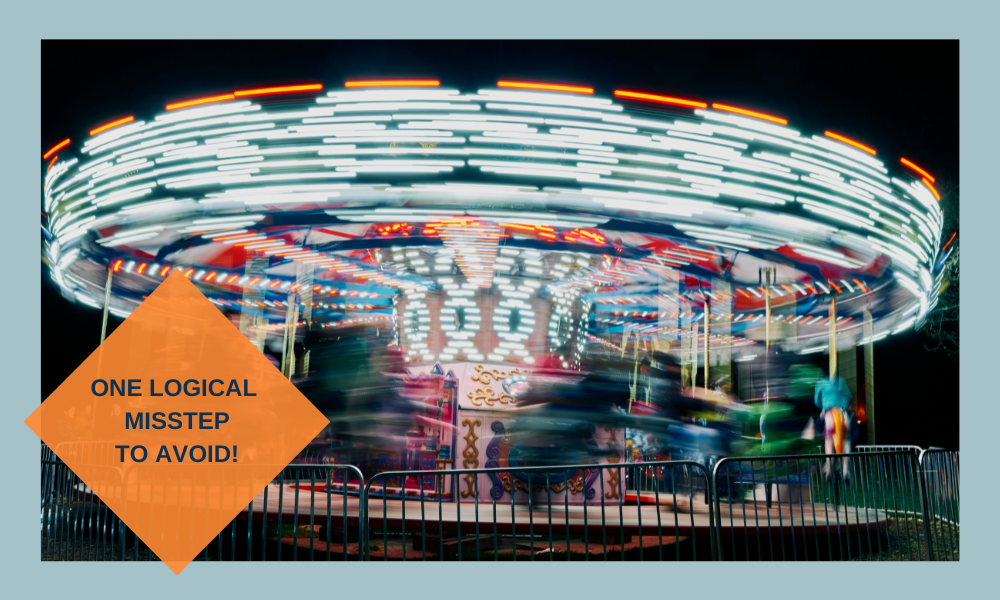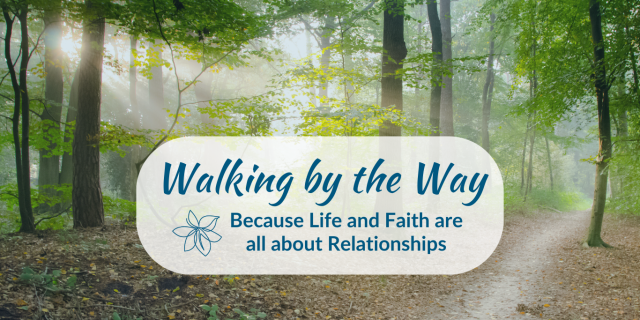In the aftermath of being offended
We never feel more certain that we are right in our opinion of a situation than in the moments after someone offends us. Your thoughts circle like a fast-spinning merry-go-round, mentally arguing against the injustice of your offender’s words.
“That was so wrong!”
Haven’t we all thought it and painfully, felt it at times? What could have been a congenial discussion, got derailed. Words tumble off track in a messy pile-up. It seems logical that whoever started the mess should clean it up. But the merry-go-round of wrongly-right assumptions in your mind won’t slow down to let you off. Objectivity has left the building, so to speak, and is unavailable to help sort out the “You said” from the “No, I said” jumble. Stalemate ensues.
In the aftermath of an offense, our senses are bathed with the strong feelings that naturally flow from being wronged.
Emotions protest within:
- “How could they?”
- “What did I do to deserve that?” –
- “That was so wrong, so unfair!”
The injustice of that moment settles hard upon your soul. Watch out; there may be an unintended logical misstep in your future!
[Disclaimer: The scenario in view throughout this post is applicable to generally healthy relationships at home or in your community. In this non-destructive context, disagreements and conflicts can benefit from training in communication skills and relationship coaching. Communication in destructive relationships involves control issues, manipulation, and verbal abuse. Please continue reading with my intended focus on non-destructive relationships.]
A new conflict has just been birthed.
The world will not be a better place for it, nor will your relationship.
In this scenario, you are left holding a burden of word wounds. Maybe the tone, the intensity, or an excessive deluge of words and gestures injured your soul. Clearly, you have been wronged. However, you are not yet sure what to do about it. Being a decent, law-abiding person, you rule out slashing his tires, posting it on social media, or emailing all her friends. Your blood pressure has returned to normal, your thinking is mostly rational, but your mind is still stuck on the futile merry-go-round of wrongs.
Like a broken record, the chorus keeps repeating: “I was unfairly wronged, and you were the one who wronged me.” In Bluegrass style, that would probably be: “You done me wrong; what can I do when it was you?”
As the record continues to spin, a new line gets added to the song’s refrain: “It’s true, you were the one who wronged me, so now I know – that you are wrong and I am right.”
The dominant theme that weighs on your mind and soul becomes, “You are wrong, and I am right.” It is like moving up to a bigger, brighter horse on the merry-go-round of wrongs. We build up our defenses, preparing for the next go-round because we believe that we are right and our offender is wrong.
We are blinded from seeing the logical error of “wrongly right.”
The unintended logical missteps of believing that I am right:
- It is easy to develop a fixed belief that we are right because we experienced an offensive “wrong.”
- That allows us to make the next logical misstep: You ARE wrong in bold letters.
- It now becomes about them (the person) and you (the person).
- Since you now ARE right, you feel righteously justified to be hurt and upset.
- Since this probably is not their first offense, you may also feel justified in demanding an accounting from them.
Now, your newly born conflict has just been refueled.
This is not a good time for another misstep. Two people (even though basically intelligent and loving) are getting ready to make a mess that will be painful to clean up. It will not end until somebody has the courage to jump off the spinning merry-go-round of wrongs.
So, what is going “wrong” in this scenario?
It seemed so clear on the merry-go-round. But on the merry-go-round of wrongly right, you can only see half of the circle. The rest remains out of your view. And then, you discover that on the other side of the circle, your offender has the audacity to believe that you were the offender and they were the victim. Disagreements, offenses, and other conflicts function similarly. You cannot get to root causes while circling in an endless argument of wrongs and rights.
If we rewind to the beginning, can we find the root cause?
Consider these components:
- Misstep #1: Your limited perception (A judgment was made while lacking information.)
- Misstep #2: Your fixed belief (A belief was formed on an inadequate foundation.)
- Misstep #3: Your underestimation of your role in the offensive interaction (possible lack of self/other awareness or empathy)
- Misstep #4: Your overestimation of the accuracy of your memory (of every “you said” and “I said” uttered)
If our point of view had been perfect, the outcome could have been different. The simple fact of life is this:
- Our perspective is limited.
- Our perceptions are slanted.
- Our memories are, at best – distorted fragments – just snippets of events.
- Our emotions taint the process and deceive our thoughts.
Too often, we rely on our own cognition and our perceived ability to know and understand. Our human nature wants to justify our own actions, interests, and positions. If we ignore our own human frailty, we minimize our role and maximize their offense. When we examine our virtual scorecard of offenses, inevitably, the final tally is weighted against them. Certainly, the offenses they have perpetrated against me outweigh the offenses I have committed against them. Emotions trip us up again.
The whole process gets polluted and convoluted. So, the argument that goes in circles continues. You can debate who said what and when until you are dizzy from the spin. Will what could have been resolved with an explanation and a proper apology hit a roadblock? In the end, both of you are thoroughly offended and hurt and stuck.
All because of a logical misstep:
We believed that we were right because we were wronged.
What did we miss in step #1?
What if we did not see or hear what occurred before the upsetting wrong or offense that was done to us? Then unknowingly, we will get locked too quickly into our own perspective and position to consider politely inquiring further. I confess, I regretfully have some of those stories in my journals.
Or, what if some of those things we missed were words and actions by none other than I, myself, and me? More often than we want to admit, there were words and actions that we did not recognize had been offensive to them (unintentionally so, of course).
Sometimes I have been unaware that someone’s offensive words or actions to me were just his/her wrong response to an offensive word or action from me (i.e., just prior to that moment in time). Again, I admit it. I have learned this lesson the hard way, from experience. (And yes, I hate merry-go-rounds because they do make me dizzy.)
In that learning process, I discovered a related habit that had frustrated my dear husband, Barry. You can read about it in this blog post: My Seven Million Why’s That Got Me Nowhere. (My Seven Million Whys -That got me nowhere)
Fortunately, in 2007 we stumbled across a conference that changed how we managed life, relationships, and disagreements. I had been looking online for a conference on Christian counseling but instead found that the Peacemaker Ministries’ annual Fall conference was scheduled soon, two hours from our location. We were working hard (“struggling” would be more accurate) to succeed as parents of a blended family. Finding positive help eluded us. In fact, sometimes, it felt like people did not want us to succeed.
That 2007 Conference, titled “That We May Be One,” may not have been what the doctor ordered, but it was absolutely what God had ordained for us. The conference was the beginning point of our ongoing training in Biblical Peacemaking. As a result, we learned how to get off and stay away from the merry-go-round of wrongly right.
The foundational principles and skills I learned from Peacemaker Ministries, The Institute for Christian Conciliation, and Relational Wisdom 360 have impacted our marriage, family, and all that I presently do as a Relationship Coach and a Christian Counselor. I am gratefully indebted to the generation of Christian conciliators who paved the way before me. Thank you, fellow conciliators; you have taught us a more excellent way to dwell together in peace.
“But the wisdom from above is first pure, then peaceable, gentle, open to reason, full of mercy and good fruits, impartial and sincere. And a harvest of righteousness is sown in peace by those who make peace.” (James 3:17-18, ESV)
The society we live in tells us to:
- have it our way
- trust our own heart
- take care of our needs first
- watch out for number one
- love myself more
- chart my own path
- follow my own heart
That flawed advice has never been able to:
- make me kinder or more patient,
- give me a broader and deeper understanding of healthy relationships
- make me more tolerant and accepting of others
It took the Bible to teach me all those better things.
Circling back to Belief:
When it comes to wrongs and offenses, human nature nudges us to underestimate the significance of our offenses against others. Which one of us really wants to believe that we are the person who is wrong? We try to excuse our fault by insisting that our intentions were good. We dodge the blame.
That brings us back to belief which is always the core issue. What do we believe about God, ourselves, and others?
Just believing that we have (or had) good intentions is not enough. Because our words can unintentionally hit like a brick.
Are you ready to learn a better way to manage offenses and disagreements?


